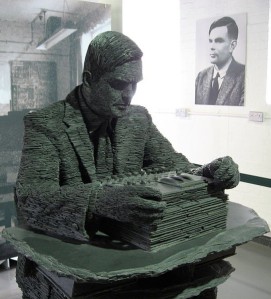After 60 years “father of modern computing” computer pioneer and WWII Enigma codebreaker Alan Turing has been given a posthumous royal pardon. Turing shortened the War, it is estimated, by 2 years saving millions of lives as 11 million were dying annually. He mechanised the manual codebreaking work done at Bletchley Park at the Government Code and Cypher School (GC&CS or GCCS) which in 1946 became GCHQ.
 Iain Stewart, a Conservative MP involved in the cross-Party campaign to secure a royal pardon, said:
Iain Stewart, a Conservative MP involved in the cross-Party campaign to secure a royal pardon, said:
“Alan Turing was an incredibly important figure in our history. He was the father of computer science and the originator of the dominant technology of the late 20th century.”
LGBT History Month 2013 remembered LGBT pioneers in maths and science including Turing and 2012 was both the centenary of his birth and 50 years since his conviction for “gross indecency” in 1952. Offered prison or so-called “organo-therapy” – chemical castration, he chose the latter, but unlike for a trans person, pumping a gay man full of female hormones was a chemical assault on his gender and sexual orientation not a relief or longed-for medical intervention. His conviction ended his career through his lost security clearance. Two years later, aged just 41, he seems to have killed himself with a cyanide-laced poisoned apple.
Thousands have sought Dr Turing’s pardon over the years, tens of thousands signed a 2009 petition which led to a public apology from No.10 Downing Street at Prime Minister Gordon Brown apologised on behalf of the nation or at least the then laws and Government that treated him “so inhumanely”, but as yet no pardon – royal or otherwise. Brown said in his statement on 10 September 2009:
“This recognition of Alan’s status as one of Britain’s most famous victims of homophobia is another step towards equality, and long overdue.”
Over 4 years later, it is indeed long overdue! LibDem peer Lord Sharkey introduced a Private Member’s Bill in the House of Lords on 25th July 2012 which called for a statutory pardon for Dr Turing. The e-petition that year received over 37,000 signatures. A royal pardon is a rare thing these days, formerly used to waive a death sentence, and usually only granted where a person has been found innocent of an offence and the approach made by a family member. In this case as the Ministry of Justice have said:
“Uniquely on this occasion a pardon has been issued without either requirement having been met, reflecting the exceptional nature of Alan Turing’s achievements.”
The pardon states:
“Now know ye that we, in consideration of circumstances humbly represented unto Us, are Graciously pleased to grant Our Grace and Mercy unto the said Alan Mathison Turing and to grant him Our Free Pardon posthumously in respect of the said convictions; And to pardon and remit unto him the sentence imposed upon him aforesaid; And for so doing this shall be a sufficient Warrant. Given at Our Court at Saint James’s the 24th day of December 2013; In the sixty-second Year of Our Reign. By Her Majesty’s Command. Chris Grayling”
It is signed by Chris Grayling, Lord Chancellor and Secretary of State for Justice. The pedantic grammatical debate as to whether he should have used St James’ or St James’s is an age old one.
The capitalisation throughout puts emphasis on respect for royalty and the “Royal prerogative of mercy”, an anachronistic and patronising term. It is a throwback to the days of rule by divine right and the monarch being the nearest thing to God, who alone had the power to forgive. It is time this too was ended.
The pardon itself, though gratefully acknowledged, raises other issues, although why should we be grateful for something that should never have happened and should not need a Queen or their representative to enact it? But why him, and not other gay men? Are we rewarding his War-shortening hero status and “excusing” his crime under 1950s laws? Do others fail to receive the same pardon because they were not war heroes, that is a slap in the face for other gay veterans. What about those imprisoned or given chemical castration or ECT against their will to rid them of homosexual desires? What about the medical pathologisation of homosexuality in the DSM an ICD (International Classification of Diseases) that continued after the criminal law was revoked and that of transsexualism that continues to this day?
In an enlightened age, although it may make a mockery of retrospective legal change, it is also mockery of human decency not to pardon all for breaching laws that we now consider an affront to human rights. Turing’s “Royal” pardon should be extended to tens of thousands of people convicted of homosexuality-related crimes, campaigners have said.
Veteran LGBT activist and campaigner Peter Tatchell said:
“Singling out Turing just because he is famous is wrong. Unlike Alan, many thousands of ordinary gay and bisexual men who were convicted under the same law have never been offered a pardon and will never get one. An apology and pardon is due to another 50,000-plus men who were also convicted of consenting, victimless homosexual relationships during the 20th century.”
It is also poignant as it comes at a time when President Putin in Russia has brought in Section 28 style laws that have criminalised educating the young about homosexuality and cast a shadow over February’s forthcoming Sochi Winter Olympics.
Worse, still, is Uganda’s recent passing of a Bill that criminalises homosexuality with terms of up to life imprisonment and makes the non-reporting of gay people also a criminal offence. The so-called “Kill the Gays bill” was passed just 4 days ago and is already raising fears of an impending tide of violence, fear and witch hunts, as in Russia. Homosexual “gross indecency”, similar to the British law under which Turing was convicted, is still on the statute books of Uganda, and new stronger laws are being made, with many calling for the death penalty for homosexuality. Some of these campaigns are supported by fundamentalist Christians in the USA.
The same argument that Putin has used, that homosexuality and the “genderless and infertile Western tolerance” destroys traditional family, and that people need laws to protect them from it, is being peddled around many of the 38 African countries that ban it. PM David Cameron has called for aid cuts to nations such as Uganda that deny LGBT rights.
Grateful and grudging though my appreciation is for this pardon, it should be the beginning of blanket retrospective amnesties not an act of royal “Grace and Mercy”, though it is fitting that this pardon comes at Christmas, which symbolically, whether you hold Christian beliefs or not, marks the birth of a royal pardon for all.
